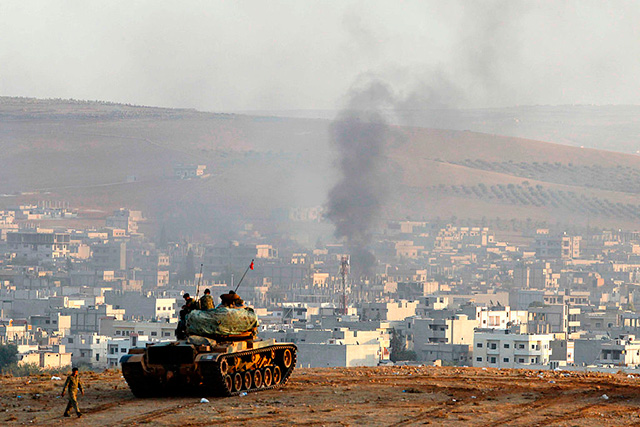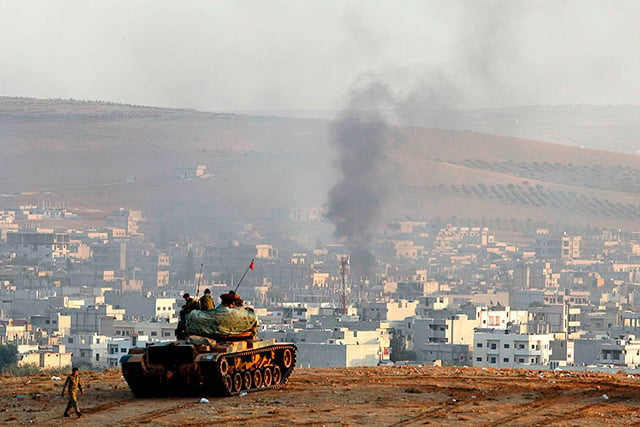
Honest, paywall-free news is rare. Please support our boldly independent journalism with a donation of any size.
 Turkish tanks hold their position on a hilltop on the outskirts of Suruç, Turkey, on the Turkey-Syria border, following an airstrike in Kobani, Syria, on October 9, 2014. (Photo : Gokhan Sahin / Getty Images)
Turkish tanks hold their position on a hilltop on the outskirts of Suruç, Turkey, on the Turkey-Syria border, following an airstrike in Kobani, Syria, on October 9, 2014. (Photo : Gokhan Sahin / Getty Images)
Why are journalists and academics on the left in such dramatic disagreement when it comes to Syria, Assad and US involvement?
In this interview, University of San Francisco Professor Stephen Zunes — a widely recognized scholar of US and Middle East policies and the author of Tinderbox: US Middle East Policy and the Roots of Terrorism — offers his take on the US left and its respective positions on Syria.
Daniel Falcone: Can you give a background and provide some context on what you see to be the points of division on the left in regards to the US policy involving Syria?
Stephen Zunes: Most credible academics and journalists on the left, while varying to some degree in their analyses, generally agree that the Syrian regime is horrifically repressive and not particularly progressive by any measure.
There is also a consensus that the bulk of the armed opposition is dominated by reactionary Salafist extremists and that the largely nonviolent movement that first emerged in 2011 had strong progressive and democratic elements, but has largely been crushed. Further, the United States and other outside powers (Saudi Arabia, Turkey, Qatar, Russia, Iran, Hezbollah, Britain, France, etc.) should not be bombing, sending arms, providing troops or contributing to the carnage in any way.
There are some bloggers who are part of certain small sectarian groups and/or have gone on Syrian-government-sponsored tours who call themselves “independent journalists,” but they essentially embrace the Syrian government’s line and have little credibility. (In these tours, participants rely on government-provided translators, cannot interview anyone independently without a government minder present, only visit areas under government control and do not meet with any genuine dissidents.)
In certain respects, the divisions parallel those between the more democratic left and the more authoritarian left, those motivated more by universal principles versus those motivated more by ideology, and those who recognize the complexities of situations like Syria versus those with a more simplistic either/or mindset. Where there is a fair degree of unity between both sides is opposition to US military intervention, arms transfers or other actions that would just increase the carnage.
When it comes to Bashar al-Assad, the left seems to have such a varied approach concerning his actions and philosophies. If I, for example, am critical of Assad, I could be called an “alt-imperialist.” At the same time, however, if I fail to criticize Assad, I could be called the same. What is exactly taking place here? Where does the middle ground fall in your view?
The Syrian government is essentially a family dictatorship rooted in the anti-leftist military wing of the Ba’ath Party. Virtually the only “liberalization” that has taken place under the younger Assad has been economic, privatizing once-public assets to various crony capitalists who pledge fealty to the regime. Just because the United States and other Western governments oppose a particular leader out of their hypocritical imperialist interests doesn’t thereby make that leader “progressive.”
Defending or denying war crimes in the name of “fighting terrorism” — such as bombing heavily-populated urban neighborhoods — is wrong, whether it is done by the armed forces of Syria, Israel, Saudi Arabia or the United States. As a US citizen, I feel a special responsibility to put my energy primarily toward exposing and condemning war crimes committed by US forces and other forces armed by the United States, but it doesn’t mean war crimes are any less wrong if committed by some other government using some other countries’ weapons.
Similarly, one can both oppose atrocities committed by the Syrian regime, as well as rebel atrocities and US military intervention. Indeed, US intervention in Syria has resulted in even more innocent people getting killed — a reminder that US military intervention generally has little to do with human rights and a lot more to do with advancing hegemonic interests.
How would you evaluate and compare the Obama foreign policy regarding Syria as opposed to how the Trump doctrine might materialize in the region?
Obama was under enormous pressure by both Republicans as well as Democratic hawks in Congress and his own administration to become militarily involved in Syria. He ended up rejecting some proposed forms of intervention and supporting others. Initially, it involved limited training and arms transfers to so-called “moderate” rebels, which either tended to never gain much traction or ended up in coalition with hardline Islamists. He then insisted that aid only go to rebels fighting ISIS, not the Syrian regime, and focused largely on providing support for the Syrian Democratic Forces, a coalition led by the leftist Kurdish YPG.
During his final two years in office, the US also began bombing ISIS. While US intervention has contributed (along with a number of other factors) to strategic setbacks for ISIS, the United States has had little impact on the insurgency against Assad — the initial nonviolent uprising was largely spontaneous and indigenous, the main rebel groups’ arms did not come directly from the United States, and the carnage would not be substantially less if Obama had not intervened at all.
Trump, however, has not only dramatically escalated the bombing of ISIS-controlled areas, resulting in a dramatic rise in civilian casualties, but he has also begun directly targeting the Syrian government and its allies, including bombing a Syrian air base, shooting down a Syrian plane and attacking a government-aligned Shia militia. This is an illegal and dangerous escalation that could trigger a direct confrontation with Iran or even Russia and is therefore particularly disturbing (just the sort of thing Obama was trying to avoid, and which even the Pentagon is concerned about).
Seymour Hersh has just reported that Trump knew of the Assad “false flag” concerning chemical weapons and bombed Syria anyway. This is not to mean that Assad doesn’t terrorize his own people, but was this simply done to show that Trump is a “tough guy”?
I’ve been a fan of Sy Hersh for decades, but I’ve actually been pretty skeptical of much of his reporting on Syria. Evidence of Syrian government culpability in both chemical weapons attacks is pretty strong (including from credible non-US sources which have also been critical of war crimes by the United States and its allies). Regarding Hersh’s article in Die Welt, I generally find evidence from medical professionals, forensic experts, independent strategic analysts and reputable human rights groups more credible than a single article rejected by the journal that originally assigned it because they found it based primarily on unnamed sources, and therefore unconvincing.
I never read the White House report on the Khan Shaykhun tragedy because I don’t trust them and I recognize it’s quite possible they could indeed manufacture an incident or a crisis to justify further US military involvement. At the same time, I’ve seen other reports which make a strong case for Syrian government responsibility and why the alternative scenarios are not plausible. The bottom line is that, regardless of who was responsible, the United States should not be bombing Syria, and the left should be focusing on the illegal and dangerous implications of such escalation and working on stopping it rather than pushing unfounded conspiracy theories, which just hurts our credibility.
Recently, Veterans for Peace confronted journalist Amy Goodman for biased Syrian coverage. Have you seen their letter to Goodman and can you talk about how this illustrates further the progressive media’s divide on Syria? Where can one get the “correct” perspectives for this conflict?
I certainly don’t trust the mainstream US media (which tend to support the US government line) to tell the truth about Syria, but I don’t trust RT, Global Research or various other conspiracy websites (which tend to back the Syrian government line) to tell the truth either. I actually think Democracy Now! has been quite good on the subject. Indeed, Amy Goodman has demonstrated more integrity and personal bravery than virtually any journalist I know. She was nearly killed exposing atrocities by the US-backed Indonesian government in occupied East Timor and has reported on innumerable crimes by the United States and its allies, exposing some of the worst aspects of US imperialism. She has also reported on atrocities by Syrian rebel groups and the ways in which the United States, reactionary Arab monarchies and others have contributed to Syria’s tragedy and how both the Obama and Trump administration have misled the public.
She is a very credible source of information, so these claims that she has suddenly embraced a pro-Washington bias are ridiculous. I couldn’t help but note that the open letter presented by that local Veterans for Peace group called on her to bring in guests they say “who know about Syria.” The only potential guest they mentioned, however, was their vice president, who took part in one those Syrian government-arranged tours and otherwise has little background or knowledge of the country. By contrast, Amy’s guests have mostly been reputable academics, journalists and human rights activists who — despite differences of opinion on a range of matters involving Syria — really do know the country.
Media that fights fascism
Truthout is funded almost entirely by readers — that’s why we can speak truth to power and cut against the mainstream narrative. But independent journalists at Truthout face mounting political repression under Trump.
We rely on your support to survive McCarthyist censorship. Please make a tax-deductible one-time or monthly donation.